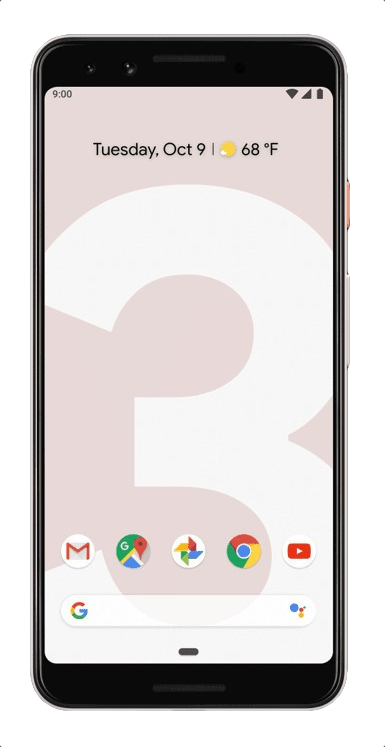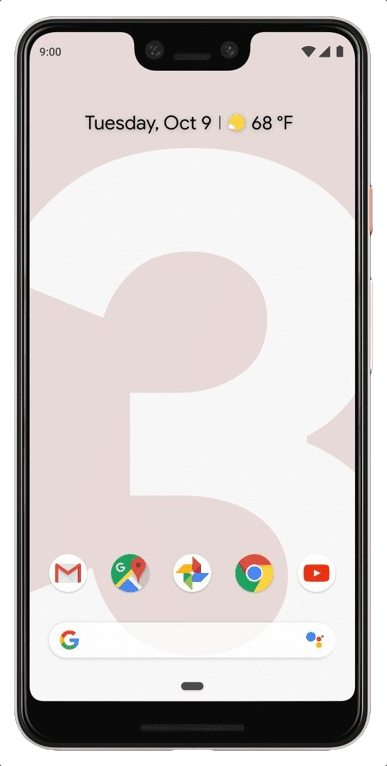Most phones come in just one size... but Google gives us two options with the Pixel 3 and Pixel 3 XL. We've used both to find the high and low points to help you decide which size is right for you.
Google Pixel 3
Compact yet powerful

Pros
- Easily usable in one hand
- Excellent camera
- Stereo speakers
- Wireless charging
Cons
- Weak battery life
- No headphone jack
It's a relatively small phone, but the Pixel 3 has all of the same features and power of the larger 3 XL. The 5.5-inch 18:9 display looks excellent, and makes the phone compact enough for anyone to use with one hand. The only potential downside here is a smaller-than-average 2915mAh battery.
Google Pixel 3 XL
True flagship

Pros
- Big screen
- Excellent camera
- Stereo speakers
- Wireless charging
- Sizable battery
Cons
- Huge display notch
- No headphone jack
Google took the Pixel 2 XL's body and fit a much larger 6.3-inch 18.5:9 display — and it's not all about size, the screen is also dramatically better. The rest of the phone builds on all of Google's strengths: simple hardware, capable specs, smooth software, and an amazing camera front and back. It even has a sizable battery inside.
Google does a great job of offering a high-end smartphone experience in two different sizes with very few compromises. That philosophy carries into the Pixel 3 and Pixel 3 XL, which are identical aside from the changes necessitated by their size differences.
What's the difference between the Pixel 3 and Pixel 3 XL?
The best way to start this comparison is to talk about everything that's shared between these phones — and thankfully for potential Pixel 3 and 3 XL buyers, most of the experience is identical. Both have identical internal specs, anchored by a Snapdragon 845, 4GB of RAM and 64GB of storage. The cameras, too, are shared, including the dual front-facing shooters. Both have stereo speakers, and both miss out on a headphone jack. The hardware is absolutely the same from top to bottom — without a reference for size, you can't tell the difference between the two in a photo. And they even come in the same three color choices: black, white and "not pink."
| Category | Pixel 3 | Pixel 3 XL |
|---|---|---|
| Operating system | Android 9 Pie | Android 9 Pie |
| Display | 5.5-inch OLED 2160x1080 (18:9) Gorilla Glass 5 |
6.3-inch OLED 2960x1440 (18.5:9) Gorilla Glass 5 |
| Processor | Qualcomm Snapdragon 845 Pixel Visual Core |
Qualcomm Snapdragon 845 Pixel Visual Core |
| RAM | 4GB | 4GB |
| Storage | 64/128GB | 64/128GB |
| Expandable | No | No |
| Rear camera | 12.2MP, 1.4-micron, PDAF f/1.8, OIS |
12.2MP, 1.4-micron, PDAF f/1.8, OIS |
| Front camera 1 | 8MP, auto focus f/1.8, 75-degree lens |
8MP, auto focus f/1.8, 75-degree lens |
| Front camera 2 | 8MP, fixed focus f/2.2, 97-degree lens |
8MP, fixed focus f/2.2, 97-degree lens |
| Connectivity | Wi-Fi 802.11ac 2x2 MIMO, Bluetooth 5.0 LE, NFC, GPS | Wi-Fi 802.11ac 2x2 MIMO, Bluetooth 5.0 LE, NFC, GPS |
| Audio | Stereo speakers USB-C |
Stereo speakers USB-C |
| Battery | 2915mAh Non-removable |
3430mAh Non-removable |
| Charging | 18W USB-C PD Qi wireless |
18W USB-C PD Qi wireless |
| Water resistance | IP68 | IP68 |
| Security | Fingerprint sensor | Fingerprint sensor |
| Dimensions | 68.2 x 145.6 x 7.9 mm 148 g |
76.7 x 158.0 x 7.9 mm 184 g |
| Colors | Just Black, Very White, Not Pink | Just Black, Very White, Not Pink |
There are just two differences to evaluate: screen size and battery. I specifically say screen size because Google worked very hard to make sure this year's phones have identical-looking displays. Whether you get the 6.3-inch Pixel 3 XL or smaller 5.5-inch Pixel 3, the OLED panels have been selected and calibrated to look the same. The Pixel 3 XL also has a sizable display notch that's visually distracting for some people, and cuts into the usable space of that larger panel — even still, it has a little more room than the Pixel 2 XL, and much more than the Pixel 3.
It simply comes down to screen size and battery needs.
The other necessary difference is battery — 2915 vs. 3430mAh. With a 17% larger battery, the Pixel 3 XL has noticeably longer battery life. The Pixel 3 can get through a day without charging, but not if you have any intense usage throughout the day. Lots of time using streaming apps or games will have you looking for a charger. However, the Pixel 3 XL can take a bit more abuse and still make it to the end of the day just fine. Some are willing to take that battery trade-off to have a phone they can easily use one-handed, but it isn't always worth it for everyone.
The screen size differences obviously lead to changes in overall phone size. The Pixel 3 is a bit of a unicorn amongst modern-day flagship phones, with a very compact case that's marginally smaller than the Pixel 2. It's easily manageable in one hand, and easier to slip into a pocket even with a case on it. The Pixel 3 XL, on the other hand, follows the flagship trend of being really large. It's about 12% wider and 8% taller than the Pixel 3, which is considerable — but of course, you get the extra screen and battery as a benefit. You have to decide if it's worth it for your needs (and hands).
Google Pixel 3
Compact yet powerful

A great phone without the massive size and weight.
A smaller screen doesn't lead to compromises in features or hardware. The Pixel 3 has everything the XL does, aside from battery life. You get fantastic software, performance, camera capabilities, and screen quality.
Google Pixel 3 XL
True flagship

Google's best-ever phone, with a big screen and battery to match its capabilities.
A 6.3-inch OLED screen is dramatically improved from the Pixel 2 XL, and the rest of the experience builds on Google's strengths: excellent software, great performance, innovative camera features, and guaranteed updates.
Tidak ada komentar:
Posting Komentar